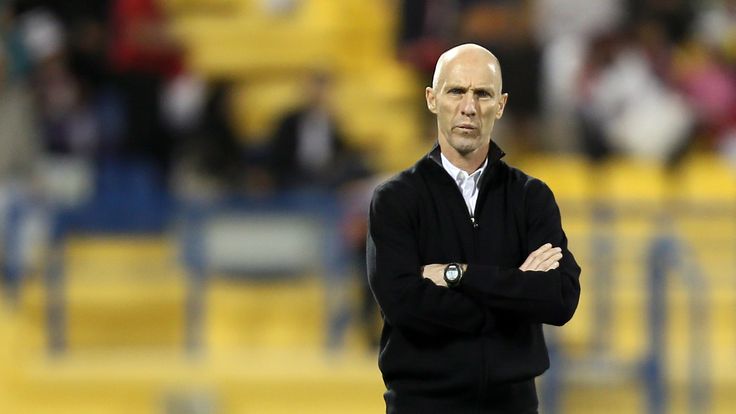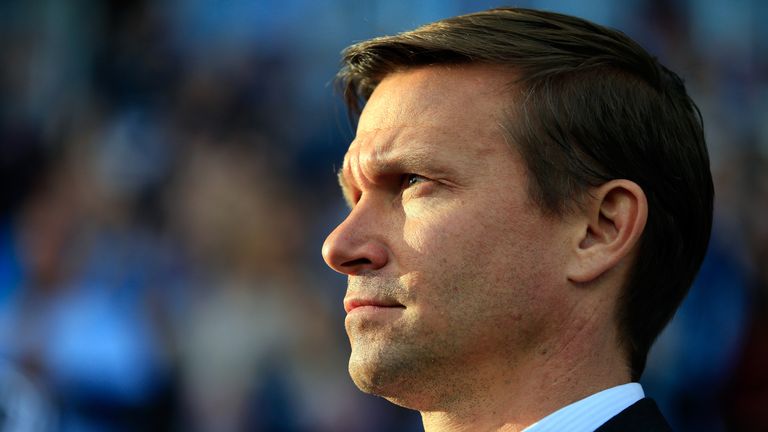Who is new Swansea boss Bob Bradley? We profile the American coming to the Premier League

Monday 3 October 2016 14:16, UK
American Bob Bradley is the new Swansea manager - but what do we know about him?
The 58-year-old leaves French club Le Havre to take over from Italian Francesco Guidolin at the Liberty Stadium.
Here we take a look at Bradley's history in the game and style of management...
Career overview
Bradley's managerial career has seen him rise from a college - and USA U23 assistant - coach to the manager of the US National team. Bradley moved to become DC United assistant in the inaugural MLS season under Bruce Arena.
Trending
- Fury rages: I was robbed... Usyk got a Christmas gift!
- Highlights: Usyk overcomes Fury in epic heavyweight rematch
- Usyk denies Fury in intense world championship rematch
- 'He got a Christmas gift!' | Fury left fuming in post-fight press conference
- Papers: Arsenal, Man City and Bayern in three-way battle for Olmo
- Littler tested on emotional Worlds return: 'Never felt anything like that'
- 'Uncle Frank is blind!' | Usyk responds to Fury complaints
- Transfer Centre LIVE! Dele says goodbye to Everton - Como next?
- Big fight reaction: What next for Fury and Usyk after contentious call?
- World Darts Championship schedule: Anderson headlines Sunday's action
He managed Chicago Fire for two seasons before taking charge of the New York MetroStars (now the Red Bulls) until 2005. Bradley went on to manage Chivas USA for the 2006 season, turning around a waning franchise to the western conference play-offs.
After impressing at Chivas, Bradley became the US National team interim manager after a disappointing 2006 World Cup. Bob's son - Michael - went from fringe player to a key man for the US national team and Bradley was named permanent manager in May 2007. He managed them all the way up to the 2011 Gold Cup in July.
In October 2011, Bradley took charge of the Egypt national team and lived in a war-torn nation through the chaotic aftermath of the Egyptian revolution. He also managed the country despite the Egyptian Premier League being suspended following the Port Said Stadium riot where 74 people died.
Bradley then went on to manage Norwegian club Stabæk, before moving to French Ligue 2 club Le Havre.
Achievements
In his two years as manager of Chicago Fire, he won the league and cup double in his first season (1998). He was named MLS Coach of the Year, before winning the Open Cup again in 2000.
At the New York MetroStars, Bradley failed to win any silverware despite taking them to their first (and only) US Open Cup final only to lose 1-0 to his former club Chicago Fire.
Impressive results at Chivas USA secured him the national team job, and won the 2007 CONCACAF Gold Cup 2-1 against fierce rivals Mexico, much to the US supporters' adulation.
The 2009 Confederations Cup run was arguably one of the most high-profile achievements of Bob Bradley's career. USA shocked many to reach the final of the World Cup warm-up, beating Euro 2008 champions Spain to end their 35-game unbeaten streak. The 2-0 win was thanks to goals from Jozy Altidore and Clint Dempsey. However, the dream run came to an end after a 3-2 loss in the final to Brazil after being 2-0 up at half-time. Lucio's 84th minute header proved the decider.
Bradley took a second string team to the 2009 Gold Cup as it was played so soon after the Confederations Cup. They got to the final, but lost 5-0 to Mexico.
But USA responded by qualifying for the 2010 World Cup, topping their group ahead of England, Algeria and Slovenia, following a 1-1 draw with Fabio Capello's Three Lions. USA went out in the first knock-out round to Ghana, 2-1 after extra time.
Bradley then took USA to the 2011 Gold Cup final, but lost again to Mexico - this time 4-2 after being 2-0 up. He was sacked after the tournament.
As Egypt manager, Bradley won all of their first six matches of 2014 World Cup qualification, before losing - again - to Ghana 7-3 on aggregate in the final round of qualification. Bradley was let go afterwards. His tenure as Egypt manager was the subject of a documentary "American Pharaoh" aired in USA.
Bradley's career move to Norway proved successful, where he took the newly-promoted Stabæk to ninth place before rising to third the following year. At Le Havre, he took the team to a fourth-place finish in his first season, just missing out on promotion to Ligue 1.
Management style
Bradley has built a career on a number of different playing styles and his coaching methods on several models, but his teams usually set up for the counter-attack with a hard-working defence.
His flexibility has been witnessed since Bradley was coaching college teams, where he attempted to mirror the playing style of the great AC Milan team of the 1990s. Players were tasked to take on roles similar to that of Demetrio Albertini, the 'Libero' role mastered by Franco Baresi and Paolo Maldini during his time coaching Princeton.
At Chicago Fire, it was a 3-5-2 while the US national team played a more conventional 4-4-2 with a strike partnership involving Jozy Altidore, with Clint Dempsey and Landon Donovan on the wings.
Bradley is keen to adapt to different playing styles depending on the club, a trait he explained in a FourFourTwo interview last year: "One of the things I said in Egypt and here [at then-current club Stabæk] - maybe on the first day - was 'I don't come here with all the answers'," Bradley said. "I come here to observe and listen. Don't get me wrong, I have my own ideas, but I also need to get to know you."
Hard work, adaptability and a willingness to listen may be required at Swansea, where Bradley's first task would be to get the club out of a relegation scrap.
What they say about him
In the 2015 MLS season, three of the head coaches were managed by Bob Bradley during their playing careers, whilst another 13 are in assistant roles. Bradley-influenced coaches were on staffs of more than half the league's 20 teams and several have been head coaches in Africa, Europe and the U.S.
Two of his former players - now managers - have spoken highly of the former national team coach.
Philadelphia head coach Jim Curtin: "Everyone around Bob becomes a student of the game," Curtin said. "He has a way of questioning and challenging you and getting the most out of you. My second year with him I realized I wanted to be a coach. The environment Bob created, he challenged players to kind of think as coaches, as well. He's a guy I looked up to, a father figure, and I didn't want to let him down."
New York Red Bulls head coach Jesse Marsch: "Bob's work ethic was more than any person I've ever seen in my entire life. His attention to detail, preparation, what he put into his work and his job every day was very contagious within the team. It was very apparent how thorough he was at every level. You knew you went into matches more prepared than the opponent."
And Swansea City chairman Huw Jenkins said: "We are delighted Bob has agreed to join us. He is highly regarded as a coach and has a wealth of experience on the international and domestic front.
"He is well aware of the club's footballing philosophy and will provide us with strong leadership qualities and a renewed belief to compete at this level."
What he says
When Bradley and his family decided to stay in Egypt during the revolution: "The question I have been asked more than any other is 'why did we stay?'" Bradley said.
"But for me it was simple. When you get involved in something, when you have a goal and when you get to know people and when you are challenging them every day to be part of something and to be committed and to stick with it, even if it's not easy, I think it's important that you show them that you are in for the long haul. I don't think you are a good leader if at that moment you show any weakness."
On his future (speaking in July 2015): "I always have the confidence in my ability, but the question is if a team in the Bundesliga needs a coach, have I proved myself to them?"
"When I went to Athletic Bilbao recently it was because they sponsor a film festival," Bradley added. "A club like Athletic Bilbao that has so much passion in the club and what their youth system and first team is all about, I'd love to go to any club that has that way of doing things - that history. Where could that be? It could be in a lot of places."








